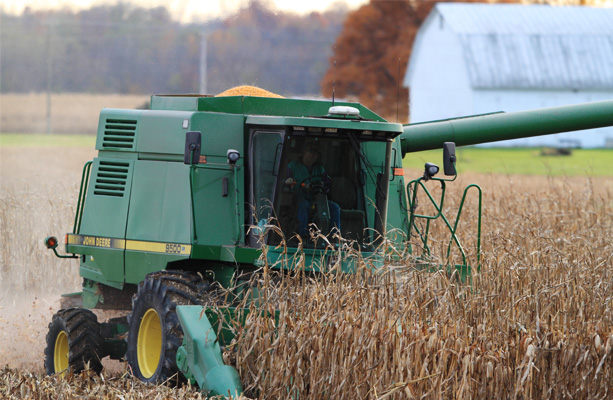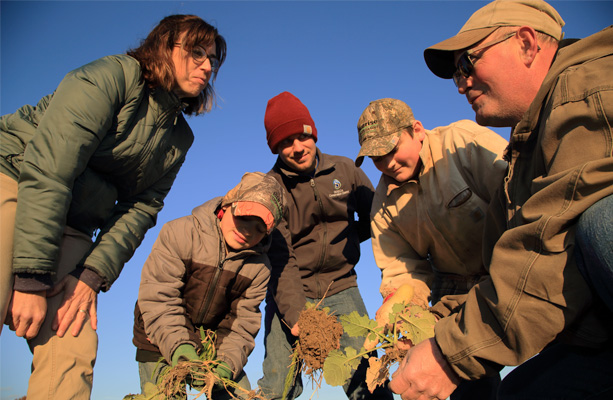Stopped Thousands of Pounds of Nitrogen from Entering the Lakes
BMP Challenge – A Financial Safety Net for Farmers to Adopt Great Lakes-friendly Practices
- By admin_glpf
In 2002, the Great Lakes Protection Fund organized a team of insurers, farm operators, farm advisors and federal and state farm agencies to develop warranty products to protect farmers against financial losses that might result from adopting new best management practices. From this effort, the BMP Challenge was born.
The BMP Challenge provided a risk-free opportunity for producers to see proof on their own farm that new practices could be profitable. Farmers entered more than 15,000 acres of corn (grown for grain or silage) into the program and later included sweet corn and tomato crops. The impact was significant. Nitrogen usage dropped by an average of 41 pounds per acre. This translates to taking almost 200,000 pounds of nitrogen out of use during the period from 2000 to 2009.

Guaranteed Safety Net
The concept of the challenge was to ensure farmers would not lose money when trying new practices to reduce fertilizer and chemical use. The team first proved the concept on corn, because corn is “heavily dependent on [inputs],” according to Brian Brandt, director at American Farmland Trust, who led the effort. Corn requires more pounds of fertilizer and pesticides than any other crop, and it is one of the primary crops grown in the Great Lakes region.
“Farmers aren’t always willing to tweak what they’re doing or make changes because they are worried about yield loss or loss in profit,” said Brandt.
“What we developed in response to that was a guarantee tool that allowed farmers to conduct farm research and demonstrations to tweak their system without worrying about having a loss in profit. If there was a loss, that’s where the guarantee fit in [that loss was covered]. It was successful for those farmers we worked with.”
The team worked across the Midwest and in Virginia, Maryland, Pennsylvania, and California to help farmers reduce their fertilizer and pesticide use and try out conservation tillage practices for the first time. They tested and compared old versus new actions and crop advisors conducted assessments at harvest time.
A specialty company, Agflex, Inc., was formed to build cash reserves and make payments to farmers who suffered a net loss of income as a result of trying best practices for the first time, including various forms of nutrient management. “We learned that farmers really want something to help through the transition,” said former Agflex president Thomas Green, now the president of the IPM Institute of North America.
“We found that 60 percent of farmers who took part in the challenge fully adopted the practice [on all of their corn acres].”

New Practices Become the New Normal
After participating in the program, most farmers continued the new practices without any insurance. Not only that, but they spread the practices to additional acres in their operation as well, Brandt said.
“We got farmers used to trying new things, to experimenting and seeing what would work, to try to make changes. They could make that change, maintain a profit, and yet have a positive environmental impact as well.”
The program had a long, successful life, before ending in 2014 when Agflex, Inc. closed its doors. However, the warranty framework is still strongly relevant today. It could easily form the foundation for a new BMP Challenge-style program to encourage farmers to try an ever-expanding set of new practices that could become the next set of permanent practices.
—
Start a Conversation
At the Fund, our goal is to build something—together—that delivers impact. You have an idea and a strategy in mind and we have a basin-wide perspective and experience launching new initiatives. We strongly encourage you to contact us to discuss an idea, whether fully formed or not, as a first step.
Email us at startaconversation@glpf.org